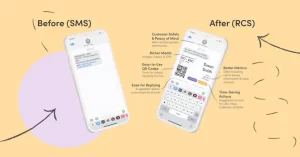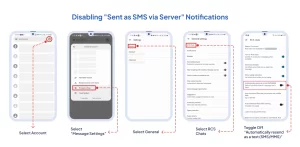Sent As SMS Via Server is a feature that enables the delivery of text messages (SMS) through a server-based platform. This functionality is particularly useful for businesses and organizations seeking to streamline their communication processes and reach a wide audience efficiently.
By leveraging server infrastructure, messages can be sent in bulk to multiple recipients simultaneously, saving time and resources compared to traditional manual messaging methods.
One of the primary benefits of using a server-based SMS solution is its scalability. Organizations can send large volumes of messages without being constrained by the limitations of individual devices or mobile networks.
This scalability ensures that important messages can reach all intended recipients promptly, even during periods of high demand or peak traffic.

Moreover, server-based SMS solutions often offer advanced features and customization options. Users can personalize messages, schedule delivery times, and track message delivery status in real-time.
This level of flexibility allows businesses to tailor their messaging strategies to meet specific communication needs and engage with their audience more effectively.
Security is another key consideration in server-based SMS solutions. By utilizing secure communication protocols and encryption techniques, organizations can protect sensitive information and ensure that messages are delivered securely to recipients’ devices.
What Is Sent As SMS Via Server?
When you attempt to send a text message to someone using an Android smartphone, you may encounter the message “Sent as SMS via server” under certain circumstances. This message typically appears when the recipient is not currently connected to Rich Communication Services (RCS).
RCS is a messaging protocol that offers advanced features and capabilities, but it requires both the sender and recipient to be connected to an RCS service profile for seamless communication.
If the recipient’s device is not connected to RCS or if their connection is unstable, RCS will default to sending your message as a regular SMS to ensure timely delivery. This fallback mechanism prevents your message from being delayed indefinitely due to connectivity issues on the recipient’s end.

However, because the message is sent as an SMS through RCS’s server rather than directly from your phone, certain features may be affected.
One notable difference is that you will not receive the usual read receipts indicating whether your message has been sent, delivered, or read by the recipient. This information is not relayed back to your device when the message is sent via RCS’s server.
Instead, you may only see that the message was sent as an SMS via the server, indicating the fallback method used to deliver your message.
What Is RCS?
If you’re unfamiliar with RCS, it stands for Rich Communication Services, representing a significant advancement beyond traditional SMS and MMS messaging. It emerged as an initiative in 2007, aiming to modernize and enrich the messaging experience by introducing features akin to those found in contemporary instant messaging applications.
RCS fundamentally enhances the capabilities of text messaging, offering functionalities that align more closely with the expectations of users accustomed to modern communication platforms. Unlike traditional SMS and MMS, RCS messages leverage data connections, enabling a broader range of features without incurring additional charges for messaging services.

However, it’s essential to note that while RCS messages typically operate free of charge over data connections, there are instances when the RCS connection cannot be established. In such cases, messages are automatically reverted to SMS format and sent through traditional cellular networks. These SMS messages may incur charges based on the specific mobile service plan subscribed to by the user.
In essence, RCS represents a pivotal evolution in messaging technology, providing users with a richer, more dynamic messaging experience while ensuring compatibility with existing SMS infrastructure and capabilities.
Read Also:- Why Your Iphone Randomly Vibrating Without Notifications? Here’s How To Fix It
How To Turn Off “Sent As SMS Via Server” Notifications
Disabling the “Sent as SMS via server” notifications is not an option, as they serve as important status messages indicating the fallback mechanism used by RCS when sending messages. However, you do have the ability to prevent RCS from automatically resorting to SMS fallback. This means that RCS will not attempt to resend your message as an SMS through its server if the RCS connection cannot be established.
It’s worth noting that while disabling SMS fallback is possible, we generally advise against it. SMS fallback is a valuable feature that ensures your messages are delivered promptly even in cases where RCS connectivity is unavailable. The notifications themselves are not overly intrusive, and disabling SMS fallback should only be considered if you find the notifications particularly bothersome or frequent.

If you do choose to disable SMS fallback for RCS, you can do so through the following steps:
1. Open the Messages app on your smartphone.
2. Tap on your profile photo located in the top right corner to access settings.
3. Navigate to Messages settings > General > RCS chats.
4. Within RCS chats settings, disable the option labeled “Automatically resend as a text (SMS/MMS).”
Conclusion
Sent as SMS via server notification serves as a crucial indicator of the fallback mechanism employed by Rich Communication Services (RCS) when encountering connectivity issues. While these notifications cannot be turned off, users have the option to disable the SMS fallback feature in RCS settings if they find the notifications too frequent or intrusive. However, it’s important to consider the implications of disabling SMS fallback, as it ensures message delivery even when RCS connectivity is unavailable.
Therefore, disabling SMS fallback should be done judiciously, weighing the benefits of minimizing notifications against the potential risk of message delivery delays. Ultimately, the decision to disable SMS fallback should be based on individual preferences and tolerance for notifications, with the understanding that it may impact the reliability of message delivery in certain situations.
